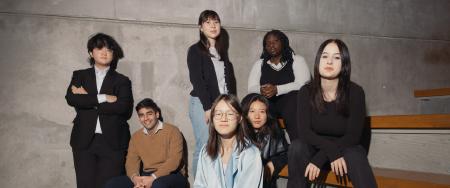
Young entrepreneurs
Raised in the digital age, independently minded, and faced with an uncertain financial future, many Gen Zers aspire to establish their own ventures.
Statistically and anecdotally, Generation Z seems to be rising on the burbling tide of entrepreneurialism – a mostly modern mix of business discipline and optimism. And the team behind the entrepreneurship ecosystem at UBC is working across the institution to ensure that the entrepreneurial ethos and skillset, which are hard to teach, are nevertheless easy to learn.
Statistically, the Global Entrepreneurship Monitor (GEM) reports that the number of Canadians involved in entrepreneurship has increased by more than 50 per cent over the last decade; in 2021, about 20 per cent of the adult population was either planning or actively starting a new business. GEM also found in 2020 that individuals aged 18 to 24 were more entrepreneurially inclined than any other age group.
Anecdotally, Fraser Pogue (BSc’04, MBA’15), a lecturer, entrepreneur-in-residence, and entrepreneurship leader at the Sauder School of Business, says that trend is well reflected at UBC. As an undergrad in the late 1990s, he says, few of his fellow students expressed any intention of creating a job in their spare time. “But now, I ask who has tried a side hustle, and a third to a half of the class put up their hands.”
It shouldn’t be a surprise, Pogue says, in part because advances in computing and technology make many kinds of innovation easier – “you have rapid prototyping and rapid software development.” But Pogue finds the gathering enthusiasm for making their own way in business also has a specific social component. “Younger people have so much access to influencer channels, on social media and even on television (Dragon’s Den, for example). They see people like themselves in entrepreneurial roles, and they begin to see it as a viable option.”
Pogue acknowledges the challenges of the current job market but says the students he sees are not being forced into the entrepreneurial space; they’re embracing it. “Students want something more exciting than a job you drag yourself into the office for every day. They want to create something unique, something the world hasn’t seen. It’s about financial autonomy, but it’s also about fun.”
Pogue teaches the COMM 280 course at Sauder, simply called Entrepreneurship. It’s a hands-on introduction to the entrepreneurial essentials such as creating viable opportunities; building a team; strategic planning; going to market; fleshing out your organization; and looking ahead to business’s future requirements, and to the complications of the entrepreneur’s evolving role.
At a higher level, Pogue also teaches New Venture Design, a 4th year course offered between Sauder and the School of Applied Science, which regularly attracts more than 240 applications for its 82 seats. The course matches business and engineering students who work together on actual ventures. Pogue describes it as a safe space to learn entrepreneurial skills: “Even if your business fails, you still get the school credit and move on – but you’ve learned about the entrepreneurial mindset!” As well, the engineering students receive a capstone credit for any prototype that they build.
“They want something more exciting than a job you drag yourself into the office for every day. They want to create something unique, something the world hasn’t seen. It’s about financial autonomy, but it’s also about fun.”
Outside the classroom, Pogue is a venture activator for entrepreneurship@UBC (e@UBC), a service that provides UBC students, recent alumni, researchers, faculty members, and staff with the resources, networks, and funding they need to succeed. e@UBC has a range of programs that support new ventures and help those involved build their entrepreneurial experience and skills. For example, the Institute for Computing, Information and Cognitive Systems (ICICS) Hatch Venture Builder is a late-stage accelerator for technical and social innovations that have already demonstrated their commercial potential. In addition to a full array of supports from e@UBC, Hatch also offers makerspace or wet lab space for testing, developing, and launching innovative products, as well as office space and access to custom developed boardrooms or conference rooms for start-ups.
For earlier stages, e@UBC offers a 16-week intensive incubator program that concentrates first on getting customer validation for new business ideas. Pogue says the program “flips the usual university approach upside down.” In traditional circumstances, he says, university researchers are inclined to develop something innovative and then go looking for a market, rather than identifying a compelling problem and a specific customer segment. Pogue stresses that this is in no way a criticism of any part of the university’s innovation infrastructure: “The world needs inventors and great inventions, but a great invention doesn’t automatically translate into a commercial success. Entrepreneurship is a mindset. We say, ‘Let’s get out of the building and check with the customers.’” The incubator is also available to people at every stage in their academic career, often giving Gen Z students a chance to test their entrepreneurial skills early.
The incubator program is free (another boon for Gen Z aspirants) and, unusually in this field, doesn’t require applicants to commit an equity share in any ultimately successful venture. Running it twice a year, e@UBC generally fields 40 applicants per cohort, accepting 15 (but often inviting the others to regroup and try again on the next round). In addition to helping with market validation, they also provide a full slate of support services, including one-one-one interactions with up to 20 mentors experienced in everything from sales and marketing to raising money, hiring, or creating culture in a new business. Venturers that prove their potential through the first round are then invited to work through an extended period of support, a one- to two-year “process of creation” that includes weekly meetings with the same array of mentors and subject-matter experts – as well as arranged pitch sessions with investors.
Students who have benefited from the incubator program are effusive in their gratitude. Khatira Daryabi, who is launching a company aimed at creating safe opportunities for Afghani women to make money by participating in an organic food export market, says the e@UBC program gave her a taste of “how it looks to live in a business world. It was a beautiful experience.” And that no matter how busy they were, Daryabi said that Pogue and others on the team were always there to help. “Not once did I hear, ‘No, go figure it out.’”
Connor Rose, another member of the most recent cohort agrees, saying that when the first release of IRLY, his proposed dating app, seemed destined for an early failure, Fraser helped IRLY retool, quickly changing from an unpopular video-meeting platform to a promising games model, and also set Rose and his partner up to raise a new round of financing to build and release a second version.
The very range of business proposals they see every year reinforces what Pogue points out as one of the fundamental challenges in the entrepreneurial world: “There is no template. The environment is not structured; it’s chaotic.”
Neil Mitra, a biomedical engineering student and health products innovator, agrees with his mentor. “Entrepreneurship is difficult because there are no right answers,” he says. “It’s not like a physics problem; it’s nondeterministic. The engineering and science are easier to deal with.”
Looking at the history of UBC spin-off companies, including leaders in engineering (Westport Innovations), high-tech (D-Wave Systems), and biotech (from QLT to Abcellera), it’s clear the university has long had an entrepreneurial inclination. Even great ideas don’t get to market by themselves. But with an expanded entrepreneurial ecosystem and a generation of students determined to make market connections – and change the world for the better – the stage is set for a new surge in technical, biomedical, and social innovation.



































